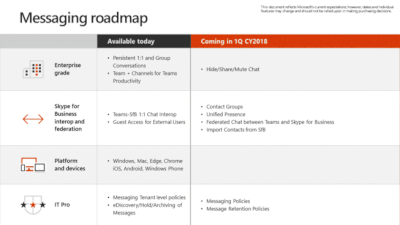By: Tiffany Wissner (WENTZEL) Microsoft
Last month at Microsoft Ignite we introduced a new vision for intelligent communications, which includes Microsoft Teams becoming the primary client for communication and collaboration in Office 365. Today we are sharing more detail on our planned roadmap for adding Microsoft Skype for Business capabilities to Teams, so you can plan your onboarding.
Messaging – Teams offers rich instant messaging capabilities today, with persistent chat, as well as private 1:1 and group chat. We expect to deliver additional messaging capabilities in Teams by the end of Q2-2018. Features will include screen sharing during chat and federation between companies.
Meetings – Teams offers collaborative meetings capabilities today, including screen sharing, meeting chats captured in the channel after the meeting, and the preview of audio conferencing. We expect to deliver additional meeting capabilities in Microsoft Teams by the end of Q2-2018. These features include meeting room support with Skype Room Systems, and cloud video interoperability capabilities that allow third party meeting room devices to connect to Teams meetings.
conferencing. We expect to deliver additional meeting capabilities in Microsoft Teams by the end of Q2-2018. These features include meeting room support with Skype Room Systems, and cloud video interoperability capabilities that allow third party meeting room devices to connect to Teams meetings.
Calling – Today, Teams offers many calling capabilities. Later this quarter, we plan to ship voicemail for Teams. By the end of Q2-2018, we will enable you to use your existing telco voice line to activate calling services in Office 365.
Beyond bringing existing Skype for Business core capabilities to Teams, we are excited about new intelligent communications coming to Teams. As shown at the Ignite Microsoft Teams and Skype for Business General Session, customers will be able to record a meeting and store it in Teams, have transcription added, and be able to search the meeting for key terms. These features will begin rolling out at the end of Q2-2018.
As part of our vision for intelligent communications, we are also taking the opportunity to simplify the naming of our premium communication offerings. PSTN Conferencing will now be known as “Audio Conferencing;” Cloud PBX will now be known as “Phone System;” and PSTN Calling will now be known as “Calling Plan.” We want these names to be more intuitive to both IT and end users as we further integrate communications with collaboration.

